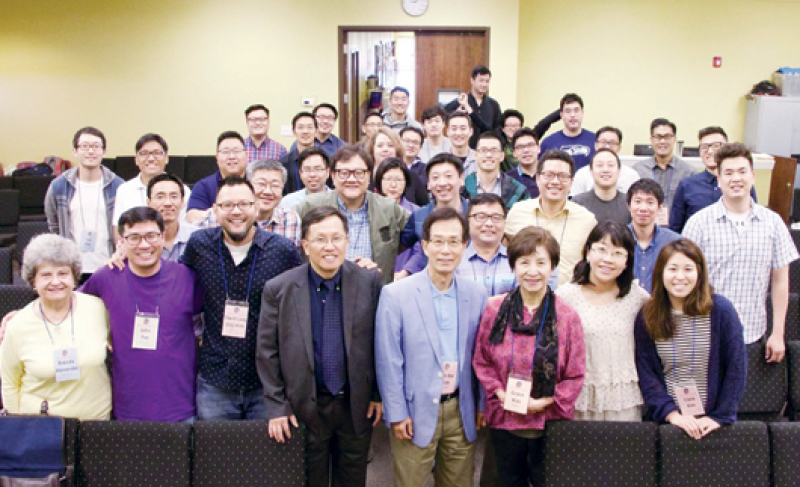
A conference for second generation Korean American pastors sponsored by the PCUSA's Racial and Ethnic Ministries Department started off on May 9, and will conclude on Thursday around noon (EST). The conference took place in Orlando, Florida.
Themed, "One Lord, One Faith, One Baptism, and One Church," this year's conference is the first that was spearheaded and organized by Korean American pastors rather than first generation Korean leaders. Previously, the gatherings had mostly been led by leaders from the National Council of Korean Presbyterian Churches (NCKPC) within the PCUSA.
"We don't want anyone to feel isolated or alone as they struggle through certain challenges," said David Kim, the lead pastor of Harvest, the English congregation of Korean Presbyterian Church of Orlando (KPCO). "We chose the theme just to remind ourselves that we are fighting together and laboring together for the sake of the gospel and for the world."
Much of the conference was spent discussing the inter-generational dynamic of the Korean immigrant church, but much on the other aspects of simply being a pastor -- such as self-care, spiritual formation, and pastoral ministry -- was also discussed.
First generation Korean pastors including James Kwon, the senior pastor of Community Church of Seattle; Paul Kim, the senior pastor of Open Door Presbyterian Church in Herndon; and Inki Kim, the senior pastor of Vision Church (the Korean congregation of KPCO), were featured as "mentor' guests during the conference and as panelists during the second day.
These pastors shared their advice regarding enduring hardship, immigrant church ministry, the importance of relationship, and balancing work and rest, among others. They also shared their thoughts on what they envision the future of the Korean American pastors to be.
"The multi-ethnic church is part of what you will have to do," shared Paul Kim. "Because the Korean immigrant [population] -- it's not going to increase; if anything, it will decrease."
"If you only focus on the Korean church, there's no future," he continued. "Look at your daily and weekly schedule. How many non-Korean contacts do you have? If you don't have many, then you won't be able to bring them to church."
"Maybe this is the time that God is stretching us to reach out to different people -- prepare yourselves for that. Culturally, a lot of interesting things are happening. LGBT issues are going to be very challening for you ... and you as a church should be prepared for that."
John Cha, the lead pastor of the English congregation at Open Door Presbyterian Church, and Paul Kim also led two sessions, one of which was entirely dedicated to sharing their own story on how their interdependent church model was formed, maintained, and strengthened through the years. Harold Kim, the senior pastor of Christ Central of Southern California, also spent time during one of the sessions sharing how Christ Central became an independent congregation but continues to share an interdependent relationship with the mother Korean congregation, Cerritos Presbyterian Church.
"Relationship is the foundation for meaningful, lasting change," said John Cha and Paul Kim as they shared their reflections. Harold Kim also emphasized relationship and said it's particularly important given the cultural context of the Korean immigrant church.
"In a White church, I might say that vision is more important," Kim said, "but in the Korean church, it's all about relationship."
Other than the issues related to the Korean immigrant church context specifically, speakers also touched upon general pastoral issues, as James Kwon spoke during the first night regarding the power of God's love, and Harold Kim spoke on the importance of thanksgiving in having a healthy ministry.
Kwon, as he emphasized God's love, said that that is the "essential element we shouldn't forget, that we should carry until the day of the Lord's coming."
"I don't know why God saved me," Kwon said. "I don't know why God called me. I don't understand. All I know is God loves me so much. Whenever I think about his love, what he has done and is doing in my life, who he is, I'm just really thankful and very happy."
Pointing to the epistles of Paul, Harold Kim said that being involved with the growth of the gospel among the church and all over the world brings about thanksgiving, and that that's significant in having a healthy church.
"How does [Apostle Paul] not cease to give thanks? This is essential to having a healthy church," Kim said. "For Paul to be continually, ceaselessly thankful, is that he is involved intimately and personally with the dynamic and irresistible growth of the gospel."
Meanwhile, though the conference was sponsored by the PCUSA, organizers said those from outside the denomination were also welcome to attend, as even some of the speakers were pastors who were ordinated outside of the PCUSA.
"We want this conference to be for God's kingdom and for his church," said David Kim.


















